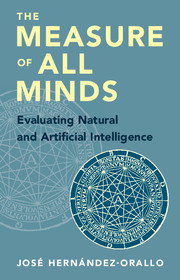Book contents
- Frontmatter
- Contents
- List of Panels
- Preface
- PART I A LONG-PONDERED OUTFIT
- PART II THE EVALUATION DISCORDANCE
- PART III THE ALGORITHMIC CONFLUENCE
- PART IV THE SOCIETY OF MINDS
- 12 Cognitive Development and Potential
- 13 Identifying Social Skills
- 14 Communication Abilities
- 15 Evaluating Collective and Hybrid Systems
- PART V THE KINGDOM OF ENDS
- References
- Index
- Plate section
12 - Cognitive Development and Potential
from PART IV - THE SOCIETY OF MINDS
Published online by Cambridge University Press: 19 January 2017
- Frontmatter
- Contents
- List of Panels
- Preface
- PART I A LONG-PONDERED OUTFIT
- PART II THE EVALUATION DISCORDANCE
- PART III THE ALGORITHMIC CONFLUENCE
- PART IV THE SOCIETY OF MINDS
- 12 Cognitive Development and Potential
- 13 Identifying Social Skills
- 14 Communication Abilities
- 15 Evaluating Collective and Hybrid Systems
- PART V THE KINGDOM OF ENDS
- References
- Index
- Plate section
Summary
G behaves as if it measured an energy. … However, there seems to be good reason for changing the concept of energy to that of ‘power’ (which, of course, is energy or work divided by time).
– Charles Spearman, Conference on Examination, quoted by Monroe (1931, pp. 156–157)ABILITIES DESCRIBE WHAT a subject is able to do. Every ability is a potential. But what if abilities evolve too? Can we detect this trend? Can some cognitive abilities lead to other abilities and traits? Also, if we ignore speed, can a universal Turing machine (UTM) acquire any ability if properly ‘educated’? More interestingly, given that humans are, in a way, UTMs, can humans acquire any ability? Positive answers to these questions, at least in theory, would be comforting. Actually, we are approaching the real conundrum of intelligence, the ability of cumulative learning, or acquiring skills. The evaluation of development will be key.
EARLY SENSORIMOTOR REPRESENTATIONS
In previous chapters we have assumed that subjects are static, and so are the tests and items designed to evaluate them. This is reasonable, precisely because behavioural features are meant to describe how a subject behaves in general, and not for a particular state. Indeed, we decided to consider cognitive abilities and personality traits, but we intentionally excluded emotional states from our measurement. However, even if we consider that a characterisation of an individual has to be done with stable traits, it is short-sighted to consider that subjects are immutable and their behavioural features do not change with time. Subjects develop. In this chapter, we analyse this dynamic, developmental perspective, known as mental, intellectual or, simply, cognitive development, and discuss its assessment from the point of view of universal psychometrics.
A dynamic view of the elements of the machine kingdom must be accompanied by some dynamics about the corresponding space of behavioural features. So far, as illustrated in Figure 10.4, tasks have been arranged into abilities for each slice of difficulty. However, a different way of looking at the space of abilities, and features in general, is to do it dynamically, in terms of development.
- Type
- Chapter
- Information
- The Measure of All MindsEvaluating Natural and Artificial Intelligence, pp. 313 - 340Publisher: Cambridge University PressPrint publication year: 2017



